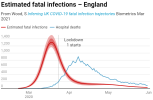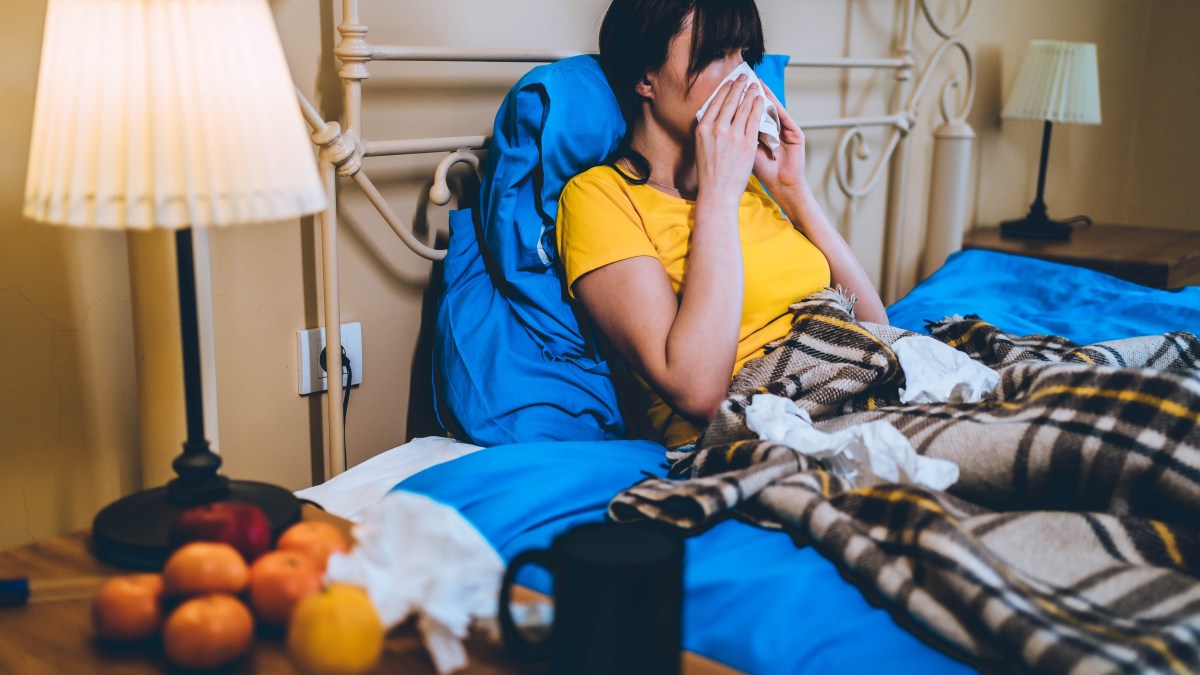Eyersey468
Established Member
- Joined
- 14 Sep 2018
- Messages
- 2,167
I agree the messaging around Covid was absolutely appalling.
All I know is three people I know of died from Covid, two of them I knew (and I would not say they were unhealthy). A fourth has long Covid and I have to cope with it. I myself got the worst Virus attack I have ever had by a long way. I cannot think of anyone I know of who has died of Flu (there must be some over the last 63 years).Can be as lost for words as you like the fact is it is less likely to be fatal to majority of population than flu.
Why? The severity of this virus was seriously overstated, I know some people died from it but they do from lots of things, we don't panic about most of them especially when there's a highly likely probability you'll recover from it.
As sad as it is knowing people who've died from it doesn't dictate it's more lethal.All I know is three people I know of died from Covid, two of them I knew (and I would not say they were unhealthy). A fourth has long Covid and I have to cope with it. I myself got the worst Virus attack I have ever had by a long way. I cannot think of anyone I know of who has died of Flu (there must be some over the last 63 years).
EDIT - also a person at my workplace spent a long time in hospital with Covid but has recovered reasonably well. So the hospitals were useful for him - the other three died in hospital having contracted Covid.
I am not saying there were no victims of lockdown btw. But there was certainly an urgent need to protect the NHS in 2020 into 2021.
It is a bit surreal thinking about what we all went through tbh. Plus it is over two years ago ! - longer than the ordeal itself.
Exactly this but seems self interest in scientific community and a fear of admitting being wrong means enquiry is likely to be a total farce that ends up costing a lot of money. A bit like the whole virus scenario but problemis some people feel that if they were honest they'd be seen as uncaring as people died. Appears heart ruling head in too many cases.Personally i was very disappointed in the scientists at the enquiry. They seemed to insist that lockdown was the only solution and the only question was when, for how long and how harsh. There seems to be absolutely no interest in looking what other countries did and what could be learned from that. Sweden and Iceland had no lockdown but lower death rate than most of Europe. Yet still the scientists completely ignore this evidence and continue down the line of lockdown being the only solution. Predicted correctly here but I am still saddened that it seems to be all about gathering evidence to support what was done, not looking at alternative approaches and finding out why countries that didn't lock down did not in fact see a higher death rate. A scientist that ignores data that doesn't support their theory is not a good scientist in my view.
There was no evidence because there was little or no testing. A lack of testing based proof does not prove a lack of the virus. If it was here in late 2019 then it was spreading, maybe it did mutate in those early months, we will never truly know. But what is clear from the data is the sharp rise in excess deaths pretty much coincided with the decision to start restrictions, including sending elderly people away from direct NHS care as well as putting up a lot of other barriers to people needing their immediate care.Fair enough we clearly going to have to agree to disagree. As far as I can see the only "evidence" that Covid was circulating in a "significant proportion" of the population before February/March 2020 is that there is evidence of some infections being present in the UK in late 2019. But clearly you disagree anyway and feel that lots of people already had had covid by February/March 2020 and that the fact that deaths increased suddenly then is unrelated to any increase in cases which may or may not have occured. Don't seem particularly persuasive to me but that's fine you do you
Circulating in significant but low levels would likely displace deaths from flu etc that we usually see in winter.But there's no spike in deaths above the 5-year average until March 2020, indeed it was below average in January/February 2020? For it to be killing significant numbers of people, which is what you'd expect if it was circulating in a "significant proportion" of the population, you would surely expect to see deaths rising above the average earlier than it did in reality? Unless the suggestion is that there were two forms of Covid. An earlier version that infected loads of people in the end of 2019 through February 2020 and was fairly benign and then a mutated version that was more lethal from February 2020 onwards?
In which case why did cases continue rise until early April?
The number of new infections per day is a key quantity for effective epidemic management. It can be estimated relatively directly by testing of random population samples. Without such direct epidemiological measurement, other approaches are required to infer whether the number of new cases is likely to be increasing or decreasing: for example, estimating the pathogen-effective reproduction number, R, using data gathered from the clinical response to the disease. For coronavirus disease 2019 (Covid-19/SARS-Cov-2), such R estimation is heavily dependent on modelling assumptions, because the available clinical case data are opportunistic observational data subject to severe temporal confounding. Given this difficulty, it is useful to retrospectively reconstruct the time course of infections from the least compromised available data, using minimal prior assumptions. A Bayesian inverse problem approach applied to UK data on first-wave Covid-19 deaths and the disease duration distribution suggests that fatal infections were in decline before full UK lockdown (24 March 2020), and that fatal infections in Sweden started to decline only a day or two later. An analysis of UK data using the model of Flaxman et al. gives the same result under relaxation of its prior assumptions on R, suggesting an enhanced role for non-pharmaceutical interventions short of full lockdown in the UK context. Similar patterns appear to have occurred in the subsequent two lockdowns.

This raises an interesting point. Both Sweden and Iceland are not known for having large populations that are crammed in cheek by jowl. So a lockdown has less to achieve for those countries. I can be very sure that their standard of life is better than ours - perhaps we should be asking why can we not each have that amount of space. That could be the inconvenient truth - there are too many people in Britain.....Personally i was very disappointed in the scientists at the enquiry. They seemed to insist that lockdown was the only solution and the only question was when, for how long and how harsh. There seems to be absolutely no interest in looking what other countries did and what could be learned from that. Sweden and Iceland had no lockdown but lower death rate than most of Europe. Yet still the scientists completely ignore this evidence and continue down the line of lockdown being the only solution. Predicted correctly here but I am still saddened that it seems to be all about gathering evidence to support what was done, not looking at alternative approaches and finding out why countries that didn't lock down did not in fact see a higher death rate. A scientist that ignores data that doesn't support their theory is not a good scientist in my view.
Well there is a conundrum here. So the death rate rose as restrictions were increased.There was no evidence because there was little or no testing. A lack of testing based proof does not prove a lack of the virus. If it was here in late 2019 then it was spreading, maybe it did mutate in those early months, we will never truly know. But what is clear from the data is the sharp rise in excess deaths pretty much coincided with the decision to start restrictions, including sending elderly people away from direct NHS care as well as putting up a lot of other barriers to people needing their immediate care.
We can agree to disagree but there is no getting away from this basic and key data point. From my perspective I can't shake the feeling that a lot of deaths were as a result of these decisions by policy makers and NHS / DoH leaders. This is where the real blame lies in my opinion, and sadly this seems to be one being skirted around.
There was plenty of discussion at the time as to the dangers of tipping elderly & poorly people from NHS care back into care homes, and I'm sure I've seem somewhere (I'll try to dig it out) some analysis from ONS that suggested that this led to over 20K+ deaths through the first wave, which would account for almost half of those additional covid-related excess deaths. So it is certainly very possible to attribute a considerable proportion of the increases directly to the decisions following lockdown, and this is before any analysis is done on the effect of locking down the spectrum of NHS care to the wider population.Well there is a conundrum here. So the death rate rose as restrictions were increased.
Now we can ask - did the death rate rise because the restrictions started or did the restrictions start because the death rate was rising.
My common sense tells me we were never going to start restrictions until it was painfully obvious we needed to. So it follows that the death rate had to rise enough to trigger a lockdown. But a lockdown does not instantly stop deaths. is takes weeks (maybe months) for the case rate to come down. So anyone looking for instant actions and instant results is being naive. Human nature dictates we are likely to do too little and then have to do too much. There was very obviously a desire to avoid doing much about covid until it was painfully obvious that we were not in control. Not doing anything was not working.
This raises an interesting point. Both Sweden and Iceland are not known for having large populations that are crammed in cheek by jowl. So a lockdown has less to achieve for those countries. I can be very sure that their standard of life is better than ours - perhaps we should be asking why can we not each have that amount of space. That could be the inconvenient truth - there are too many people in Britain.....
So is Covid and how we dealt with it the problem - or is how we live the problem ?.
Well there is a conundrum here. So the death rate rose as restrictions were increased.
Now we can ask - did the death rate rise because the restrictions started or did the restrictions start because the death rate was rising.
My common sense tells me we were never going to start restrictions until it was painfully obvious we needed to. So it follows that the death rate had to rise enough to trigger a lockdown. But a lockdown does not instantly stop deaths. is takes weeks (maybe months) for the case rate to come down. So anyone looking for instant actions and instant results is being naive. Human nature dictates we are likely to do too little and then have to do too much. There was very obviously a desire to avoid doing much about covid until it was painfully obvious that we were not in control. Not doing anything was not working.

How would that work though? Many people still have to attend work rather than work from home. Off the top of my head, anyone involved with power supplies, emergency services or food production and distribution would have to go to work. A total lockdown would be impossible.I suspect the only way to eradicate it would have been to force people to self-isolate for 6 months rather than 14 days. I also suspect that asking large sections of the populace to voluntarily put themselves under house arrest for 6 months (and I mean literally not leaving the house once during that time - I know some people did, but not many) with no way of enforcing it wouldn't have been very successful.
In reality a total lockdown would also have been unnecessary, the damage done would massively outweigh any advantages.How would that work though? Many people still have to attend work rather than work from home. Of the top of my head, anyone involved with power supplies, emergency services or food production and distribution would have to go to work. A total lockdown would be impossible.
How would that work though? Many people still have to attend work rather than work from home. Off the top of my head, anyone involved with power supplies, emergency services or food production and distribution would have to go to work. A total lockdown would be impossible.
Probably need to add the word 'forever' to that sentence because as soon as they open up again it will find its way in?The zero Covid strategy which some scientists here and across Europe advocated could never have worked outside of small isolated islands which could cut themselves off from the rest of the world.
And devastate them due to immunological naivety.Probably need to add the word 'forever' to that sentence because as soon as they open up again it will find its way in?
Are you suggesting we should have had China levels of lockdowns?Almost nowhere but China avoided lockdowns with a "propper test and trace" , and China avoided national lockdowns by locking down entire cities over a couple of cases with compliance levels wed probably never get here
No I was more pointing out the naivety of people in this thread who act like T&T was competent what happened would have been substantially differentAre you suggesting we should have had China levels of lockdowns?
Ah I see, my apologies.No I was more pointing out the naivety of people in this thread who act like T&T was competent what happened would have been substantially different

Feeling smug but annoyed at the same time. All the time and money thrown at this, which a number of us said was unnecessary at the time. We were told we were wrong, granny killers etc but actually were right and there are still people who won't admit that and say we should have locked down sooner etc.This definitely belongs in the category of things that we predicted would be the case if you simply gave it long enough.
Feeling ever so slightly smug
Feeling smug but annoyed at the same time. All the time and money thrown at this, which a number of us said was unnecessary at the time. We were told we were wrong, granny killers etc but actually were right and there are still people who won't admit that and say we should have locked down sooner etc.
Best start with all the MP’s then and lead by example…Imagine if this backfires and they just end up raising everyones fines.
There was only ever going to be one outcome, and it truly baffles me how anyone could have thought differently. The zero-covidiots are up there with the flat earth brigade when it comes to pseudoscience....
(Or maybe they just wanted to end capitalism, who knows!).
I'm not sure lockdown was anti-capitalist though. Large multinational companies weathered it much better than small companies and individuals.
